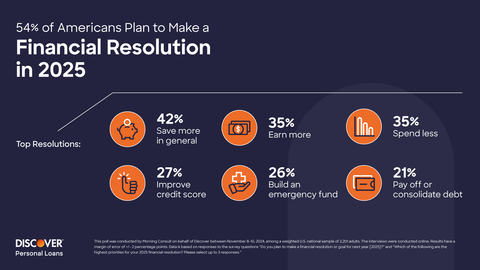|
11.12.2024 12:06:00
|
Discover Survey: Save More, Earn More and Spend Less Are Top 2025 Financial Resolutions for American Consumers
Just over half (54%) of U.S. consumers plan to make a financial resolution for 2025, according to a new national survey conducted by Discover® Personal Loans. The top financial resolutions in America are to save more in general (42%), earn more (35%), spend less (35%), improve credit scores (27%), build an emergency fund (26%) and pay off or consolidate debt (21%).
This press release features multimedia. View the full release here: https://www.businesswire.com/news/home/20241211996767/en/

According to a new national survey from Discover® Personal Loans, 54% of American consumers plan to make a financial resolution in 2025. Top resolutions are to save more in general, earn more, spend less, improve credit scores, build an emergency fund, and pay off or consolidate debt. (Graphic: Business Wire)
Meanwhile, nearly all Americans (94%) say they anticipate at least one challenge that may prevent them from achieving their financial resolutions. The top challenges cited as potential blockers include inflation (47%), unexpected expenses (39%), the state of the economy (38%), everyday expenses (37%), current income level (32%) and existing personal debt (27%).
"I encourage those planning financial resolutions to take actions now to position themselves to achieve their goals in the year ahead,” said Dan Nickele, vice president, Discover Personal Loans. "Think about, for example, creating a monthly budget that helps you save more or spend less; and setting up automatic transfers to a high-yield savings account to establish an emergency fund. Also, the interest rate outlook may give you the opportunity to refinance higher-rate debt. If you’re interested in exploring debt consolidation options, it’s a good idea to research and compare lenders that offer a great interest rate, with no origination fees or prepayment penalties.”
Conversely, 46% of Americans don’t plan to make a financial resolution. Many say it’s because they don’t like making New Year’s resolutions for anything (35%) or that they’re happy with their current financial situation (30%). Other reasons Americans said they’re choosing not to make a financial resolution include that thinking about finances causes them stress and anxiety (21%), not being ready for change (15%) and not knowing where to start (14%).
"It’s encouraging to see that so many Americans have a strong interest in improving their personal financial situations in 2025. Even if you’re not making a specific resolution, I would recommend taking any small step to get started on a path toward a brighter financial future – whether that’s saving for a specific goal or creating a game plan to manage your existing debt,” adds Nickele.
The survey also found that a majority of Americans have a cautious sense of optimism about their personal finances for the year ahead, with most saying they expect their situation to stay the same (45%) or even improve (36%). Younger generations are even more optimistic; 44% of Gen Zers and 45% of Millennials expect their financial situation to get better in 2025.
2024 Budgeting Actions vs. 2025 Budgeting Plans
Budgeting Actions |
2024 |
Budgeting Plans |
2025 |
Created a budget |
36% |
Plan to budget |
52% |
Did not create a budget |
64% |
Do not plan to make a budget |
48% |
2024 Budgeting Actions
Nearly one-quarter (22%) of U.S. consumers created a budget in 2024 and stuck to it, which they say made them feel accomplished (46%), prepared for the unexpected (38%), secure (38%), relieved (37%) and confident (36%).
Fourteen percent of Americans created a budget but weren’t able to stick with it due to unexpected expenses (45%), inflation (34%), lack of money to set aside or save (32%), feeling overwhelmed with debt (25%) and unexpected life events (25%).
Meanwhile, nearly two-thirds (64%) of Americans say they didn’t create a budget in 2024, primarily because they didn’t want or need one (57%). Other reasons consumers say they did not create a budget include that their past attempts had not been successful (24%), it felt too difficult (19%) and that they didn’t know which method to use (19%).
2025 Budgeting Plans
Just over half (52%) of Americans say they plan to take at least one budgeting action in 2025, which includes working towards a specific financial goal (51%), following a specific budgeting strategy (29%), using an app or spreadsheet (28%) and working with a financial advisor or planner (20%). Meanwhile, 25% of Americans do not plan to make a budget for 2025, and 23% don’t have a specific plan but say they will try to be generally aware of where their money is being allocated in 2025.
"I recommend consumers research common budgeting methods to help them choose an option they are most likely to stick with,” said Nickele. "For consumers who don’t plan to use a budget next year, I encourage them to financially prepare for the unexpected and to learn about options for managing any existing debt.”
Discover Personal Loans has many resources available to help consumers learn about managing debt, financing major expenses and reaching their financial goals. A personal loan calculator can help consumers find a loan term that works for their individual situation, and a debt consolidation calculator can help consumers see what they could potentially save if they were to consolidate higher-interest debt with a personal loan.
About the Survey
This poll was conducted by Morning Consult on behalf of Discover between November 8-10, 2024, among a weighted U.S. national sample of 2,201 adults. The interviews were conducted online. Results have a margin of error of +/- 2 percentage points.
About Discover
Discover Financial Services (NYSE: DFS) is a digital banking and payment services company with one of the most recognized brands in U.S. financial services. Since its inception in 1986, the company has become one of the largest card issuers in the United States. The company issues the Discover® card, America's cash rewards pioneer, and offers personal loans, home loans, checking and savings accounts and certificates of deposit through its banking business. It operates the Discover Global Network® comprised of Discover Network, with millions of merchants and cash access locations; PULSE®, one of the nation's leading ATM/debit networks; and Diners Club International®, a global payments network with acceptance around the world. For more information, visit https://www.discover.com/company.
View source version on businesswire.com: https://www.businesswire.com/news/home/20241211996767/en/
Nachrichten zu Discover Financial Services
Analysen zu Discover Financial Services
Die Assetklasse Private Debt erklärt | BX Swiss TV
Private Debt: Die rasant wachsende Anlageklasse mit grossem Potenzial für Investoren und Unternehmen!
Im Experteninterview mit Kirsten Bode von Muzinich & Co und Olivia Hähnel von der BX Swiss erfahren Sie, warum Private Debt eine spannende Alternative zur traditionellen Kreditfinanzierung ist. Die Anlageklasse ermöglicht Investoren eine sinnvolle Diversifikation, bietet attraktive Illiquiditätsprämien und zeichnet sich durch eine geringe Volatilität aus. Gleichzeitig profitieren mittelständische Unternehmen von flexiblen Finanzierungslösungen, um Wachstum und Projekte voranzutreiben. Insbesondere in Europa hat sich der Markt in den letzten zehn Jahren verdreifacht und bietet über neue Fondsmodelle auch Privatanlegern Zugang. 2025 könnte ein entscheidendes Jahr für Private Debt werden – dank sinkender Zinsen und steigender Nachfrage. Ein absolutes Muss für alle, die ihre Anlagestrategie um zukunftsträchtige Optionen erweitern wollen!
👉🏽 Jetzt auch auf BXplus anmelden und von exklusiven Inhalten rund um Investment & Trading profitieren!
Inside Trading & Investment
Mini-Futures auf SMI
Inside Fonds
Meistgelesene Nachrichten
Börse aktuell - Live Ticker
Notenbanken im Blick: SMI beendet Handel höher -- DAX schliesst tiefer -- US-Börsen mit Abgaben -- Märkte in Fernost letztlich im MinusAm Dienstag war der heimische Markt auf Richtungssuche, während sich der deutsche Leitindex tiefer zeigte. Die US-Börsen notierten am Dienstag im Minus. Die asiatischen Indizes tendierten unterdessen im Minus.
finanzen.net News
| Datum | Titel |
|---|---|
|
{{ARTIKEL.NEWS.HEAD.DATUM | date : "HH:mm" }}
|
{{ARTIKEL.NEWS.BODY.TITEL}} |
